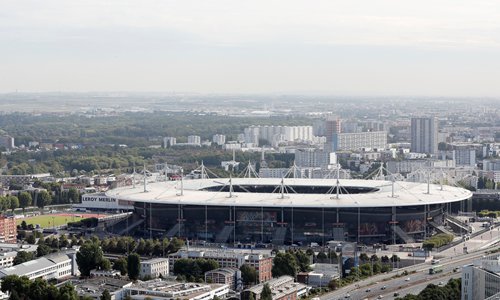HOME >> SPORTS
Paris launches work on Olympic village
Source:AFP Published: 2019/11/6 17:48:41
Project to displace residents, businesses

A general view of the Stade de France stadium in Saint Denis near Paris, France Photo: VCG
The French government earlier this week launched construction on a massive project to build from scratch the village for the 2024 Olympic Games in Paris, a development that aims to reinvigorate the poorest area in the country.
The Olympic village, which will house some 15,000 athletes and officials, is being built in the Seine-Saint-Denis area north of Paris, which for years has suffered from social tensions and neglect.
But the project is also controversial locally as it will force the relocation of residents, businesses and even schools in the area where the village is to be constructed.
Prime Minister Edouard Philippe launched the works, which are set to last over three years, in the suburb of Saint-Ouen.
Putting a strong emphasis on legacy, the authority plans, after the Games, to reconfigure the area into a new neighborhood that will offer a total of 3,000 homes and also increase participation in sports.
"If we want them [the Games] to be a success we must make sure that all this organization, all this financing and this mobilization does not just vanish when the Olympic flame goes out," said Philippe as he launched the works.
"It needs to last," he added.
Legacy is now a huge aspect of Olympic developments, especially after the success of the London 2012 Olympics which helped breathe new life into the east of the British capital.
There have already been protests locally against the Olympic village project, which requires the clearing of a zone that is home to over 20 businesses, three schools, a hotel, a student residence and a residence for foreign workers.
"We have been here for 40 years and now there is no longer any space for us," said Boubacar Diallo, who represents foreign workers living in a residence.
Two new residences should be finished by 2022 to house all those affected. But the residents are rejecting the temporary housing on offer until they are completed.
Responding to the criticism, Solideo, the public company overseeing all the works, insisted the local area would get a boost. "What is going to happen over the next 3-4 years is compensation for what has not happened the last 30 years," it said.
The budget for the games amounts to 6.8 billion euros ($7.6 billion), 1.5 billion of which will come from the state. The French authorities have long expressed concern over the stark disparities in the Paris area, with wealthy citizens concentrated in the center but northern areas far less well-off.
A report in June said rising property prices had widened the gap between rich and poor in the Paris region, where the number of people living in poverty has increased.
RELATED ARTICLES:
Posted in: OLYMPICS